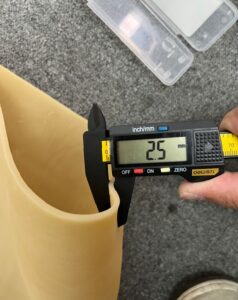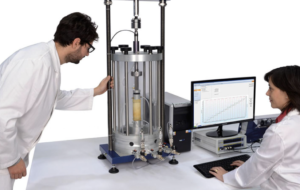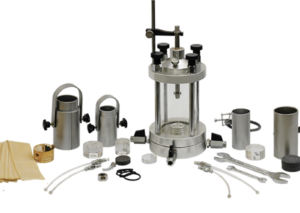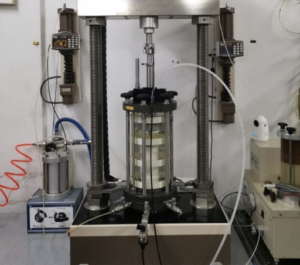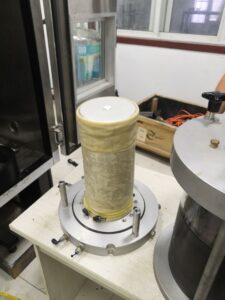How Do Soil Compaction Tests Guarantee the Stability of Logistics Warehouse Foundations?
In the fast-paced world of logistics, warehouses are the lifeblood of supply chains. These structures must withstand constant loading, heavy equipment traffic, and long-term use1—and all of it depends on a stable foundation. That’s where soil compaction tests2 come into play. By verifying soil density, strength, and moisture levels, these tests ensure that subgrades and foundation layers can support massive structural and vehicular loads without risk of settlement or failure. Here’s how they work in the context of logistics hubs and warehouse construction.
Proctor Compaction Tests to Determine Optimal Moisture Content for Warehouse Slab Subgrades
Before a warehouse slab is poured, the subgrade soil must be compacted3 to the right density and moisture condition. The Standard and Modified Proctor Tests4 identify the optimal moisture content (OMC)5 and maximum dry density (MDD)—critical values for achieving structural stability.
Why It Matters:
- Prevents differential settlement beneath slabs.
- Ensures consistent bearing capacity under forklifts and storage racks.
- Minimizes cracking and slab curling from poor support.
| Test Type | Compactive Effort (kN·m/m³) | Application |
|---|---|---|
| Standard Proctor | 592 | Light-loaded warehouse floors |
| Modified Proctor | 2,700 | Heavy-duty logistics and truck bays |
By testing multiple moisture levels, engineers determine the sweet spot where soil reaches its maximum density—ensuring long-term load resistance beneath concrete slabs.
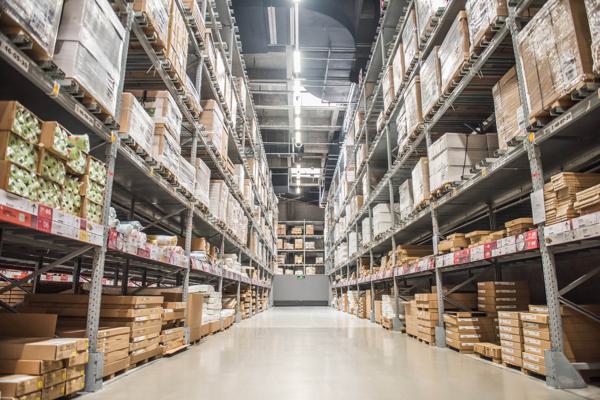
Nuclear Gauge Compaction Testing During the Construction of Heavy-Duty Vehicle Pavement in Warehouse Yards
Warehouse yards face frequent loading from trucks, trailers, and forklifts. During construction, nuclear density gauges allow real-time monitoring of soil compaction quality across large areas.
How It Works:
- A small amount of radiation is emitted into the soil to measure wet and dry density.
- Readings are compared to target densities from Proctor tests.
- Multiple readings taken quickly across the site ensure uniform compaction.
| Parameter | Typical Value for Warehouse Yard |
|---|---|
| Target Relative Compaction | ≥ 95% of MDD |
| Moisture Variation Allowance | ±2% OMC |
| Test Coverage Rate | 1 test per 300–500 m² |
This non-destructive method keeps the project on schedule while ensuring compaction meets design specs for heavy industrial use.
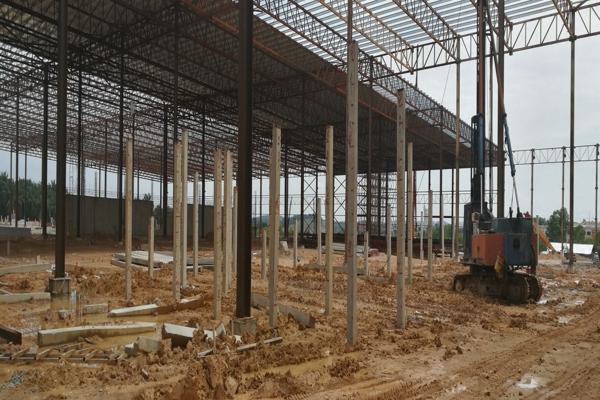
Dynamic Cone Penetrometer Tests for Assessing In-situ Compaction of Deep Foundation Soils in Logistics Hubs
Warehouses with large column loads or mezzanines6 often require deep foundations. To assess the compaction of deep fill layers or natural subsoils, engineers use the Dynamic Cone Penetrometer (DCP)7 test.
Test Highlights:
- A cone is driven into the ground by a standardized weight.
- The penetration rate is correlated to soil strength and compaction.
- Quick, portable, and suitable for multi-layer assessments.
| Depth (cm) | DCP Index (mm/blow) | Compaction Quality |
|---|---|---|
| 0–300 | 8 | Excellent |
| 300–600 | 12 | Marginal, may require rework |
| 600+ | 20+ | Poor, insufficient support |
DCP results help validate whether deep foundation zones are sufficiently compacted to support structural loads—critical for avoiding long-term settlement.

Vibratory Roller Compaction Monitoring Tests to Ensure Uniformity of Warehouse Foundation Soils
For large logistics centers, vibratory rollers are commonly used to compact base and subbase layers. Modern rollers now come equipped with intelligent compaction systems that monitor and map compaction in real time.
Monitoring Capabilities:
- Compaction Meter Values (CMV) reflect stiffness achieved.
- GPS integration allows mapping of compaction uniformity across the site.
- Alerts notify operators of soft spots or under-compacted zones.
| Zone | Average CMV | Uniformity Grade |
|---|---|---|
| Loading Dock Area | 42 | Excellent |
| Side Storage Yard | 35 | Acceptable |
| Backfill at Foundation Edge | 28 | Needs Recompaction |
This data-driven approach ensures even foundation support, especially important for wide-span warehouses where differential movement can cause operational issues.

Conclusion
Soil compaction tests are not just routine checks—they’re essential quality assurance tools8 that protect warehouse structures from the ground up. From identifying optimal moisture content9 with Proctor tests to verifying deep fill strength using DCP10, these tests ensure that every layer beneath a logistics hub is stable, durable, and ready to perform. In a sector where downtime is costly and reliability is everything, properly compacted soil is the first line of defense.
-
This resource will provide insights into the challenges faced in warehouse construction due to heavy traffic and loading, essential for logistics planning. ↩
-
Understanding soil compaction tests is crucial for ensuring the stability and safety of warehouse foundations. Explore this link to learn more. ↩
-
Understanding the compaction of subgrade soil is crucial for ensuring the stability and longevity of warehouse slabs. Explore this link for detailed insights. ↩
-
These tests are essential for determining soil properties that affect construction quality. Learn more about their importance in this resource. ↩
-
Optimal moisture content is vital for achieving the best soil compaction. Discover its impact on construction practices in this informative article. ↩
-
Understanding the structural requirements for warehouses can help in planning and construction, ensuring safety and efficiency. ↩
-
Exploring the DCP test will provide insights into soil assessment techniques crucial for engineering projects. ↩
-
Understanding these tools can enhance your knowledge of soil stability and construction quality, crucial for any logistics operation. ↩
-
Learning about moisture content determination can improve your soil testing methods, ensuring better construction outcomes. ↩
-
Exploring DCP testing methods can provide insights into soil strength assessment, vital for warehouse stability. ↩

